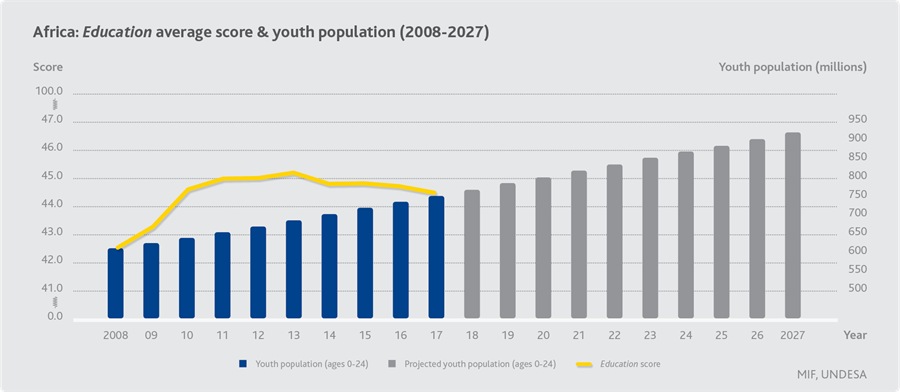2018 Ibrahim Index of African Governance
Despite strong GDP growth over the last ten years, Africa has failed to generate economic opportunities for its booming youth population
The 2018 Ibrahim Index of African Governance (IIAG), launched today by the Mo Ibrahim Foundation, highlights that public governance progress in Africa is lagging behind the needs and expectations of a growing population, composed mainly of young people.
Over the last decade, Overall Governance has on average maintained a moderate upward trajectory, with three out of four of Africa’s citizens (71.6%) living in a country where governance has improved.
African governments have struggled to translate economic growth into improved Sustainable Economic Opportunity for their citizens
Since 2008 the African average score for Sustainable Economic Opportunity has increased by 0.1 point, or 0.2%, despite a continental increase in GDP of nearly 40% over the same period. There has been virtually no progress in creating Sustainable Economic Opportunity, meaning it remains the IIAG’s worst performing and slowest improving category. Defined as the extent to which governments enable their citizens to pursue economic goals and prosper, the almost stagnant Sustainable Economic Opportunity trend strikes a concerning contrast with demographic growth and youth expectations. Africa’s population has increased by 26.0% over the last ten years and 60% of the continent’s 1.25 billion people are now under the age of 25.

A diverging picture across Africa
African countries show increasing divergence in Overall Governance performance. Continental progress is mainly driven by 15 countries that have managed to accelerate their pace of improvement over the last five years. Progress is most striking in Côte d’Ivoire, Morocco and Kenya. Divergence is also reflected in Sustainable Economic Opportunity trends. While 27 of Africa’s countries have shown some improvement, in 25 countries, accounting for 43.2% of Africa’s citizens, Sustainable Economic Opportunityperformance has declined over the last ten years.
There is no strong relationship between the size of a country’s economy and its performance in Sustainable Economic Opportunity. In 2017, four of the ten countries with the highest GDP on the continent score below the African average score for Sustainable Economic Opportunity and sit in the lower half of the rankings, namely: Algeria, Angola, Nigeria, and Sudan. Meanwhile two of the smallest economies on the continent, Seychelles and Cabo Verde, reach the 5th and 6th highest scores in providing Sustainable Economic Opportunity for their citizens.
Declining Business Environment runs counter to the growing working age population
Calling for attention is the trajectory of the African average score for Business Environment. Deteriorating by almost -5.0 points over the last ten years, this is a worrying trend given that the number of working age Africans (15-64 years old) is expected to grow by almost another 30% over the next ten years.
This will increase demand for jobs in an environment where on average progress in Sustainable Economic Opportunity is almost non-existent. Such demographic figures create a further striking contrast with the drop of -3.1 points in Satisfaction with Employment Creation since 2008.
Additionally, the indicator measuring Promotion of Socio-economic Integration of Youthregisters an average continental decline of -2.3 over the last decade.

Education outcomes are worsening
Further cause for concern is Education. While Human Development is one of the bigger success stories of the 2018 IIAG, driven by improvements in Health, the stalling progress in Education seen in last year’s IIAG has now turned to decline.
For 27 countries, Education scores registered deterioration in the last five years, meaning that for more than half (52.8%) of Africa’s youth population, education outcomes are worsening. This drop is driven by a fall in the indicators measuring whether Education is meeting the needs of the economy, education quality, and citizens’ expectations of education provision.

Civil society space is shrinking
Progress in Participation & Human Rights has been made on average. Almost four out of five of Africa’s citizens (79.6%) live in countries that have progressed in this dimension over the last decade. However, ‘free and fair’ executive elections do not always translate into a better participatory environment. Alarmingly, citizens’ political and civic space in Africa is shrinking, with worsening trends in indicators measuring Civil Society Participation, Civil Rights & Liberties, Freedom of Expression and Freedom of Association & Assembly.
Welcome progress in Rule of Law and Transparency & Accountability, which are key to sound governance performance
Although Personal Safety and National Security continue to show average decline over the last decade, Rule of Law and Transparency & Accountability have begun to register welcome progress. Rule of Law is the most improved sub-category in the IIAG over the last five years. African average performance in Transparency & Accountability has also improved, though more needs to be done as it remains the worst performing sub-category.
The IIAG highlights that citizens’ rights and welfare are key to progress in public governance. Overall Governance scores are strongly correlated with citizen-centred measures, including property rights, civil rights & liberties, government accountability and social welfare policies.
The IIAG results also confirm that Rule of Law and Transparency & Accountability are key pillars of good governance. These two sub-categories show the strongest relationships with Overall Governance scores in Africa,with strong performance in these areas being the most common components of countries that perform well. Transparency & Accountability is also strongly related to the Sustainable Economic Opportunity categoryand Business Environment sub-category, indicating that improvements in these areas will support progress and economic opportunity in Africa.
Mo Ibrahim, Chair of the Mo Ibrahim Foundation, said:
“We welcome progress in Overall Governance, but the lost opportunity of the past decade is deeply concerning. Africa has a huge challenge ahead. Its large and youthful potential workforce could transform the continent for the better, but this opportunity is close to being squandered. The evidence is clear – young citizens of Africa need hope, prospects and opportunities. Its leaders need to speed up job creation to sustain progress and stave off deterioration. The time to act is now.”
Join the Facebook Live, Monday 29 October, 12.00 GMT: https://www.facebook.com/MoIbrahimFoundation

